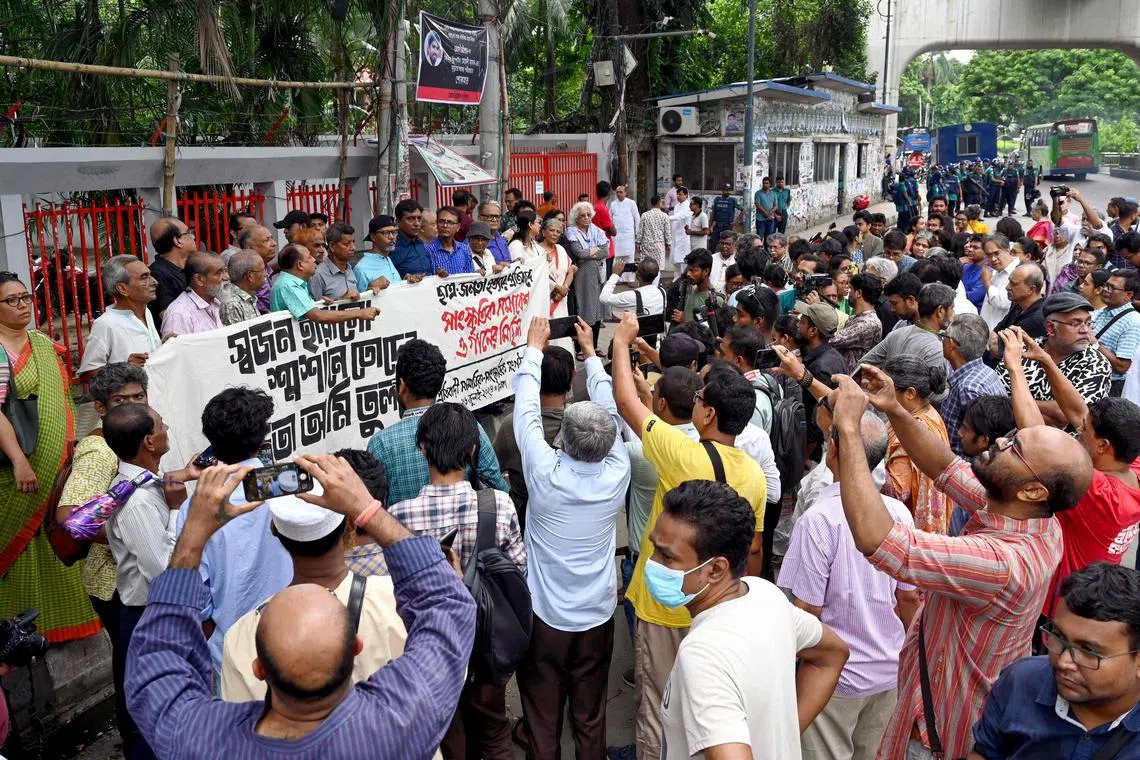Bangladesh says protests’ student leaders held for their own safety
Sign up now: Get ST's newsletters delivered to your inbox

People marching to protest against killings and mass arrest in Dhaka.
PHOTO: AFP
Follow topic:
Dhaka - Bangladesh said three student leaders had been taken into custody for their own safety, after the government blamed their protests against civil service job quotas
Students Against Discrimination head Nahid Islam and two other senior members of the protest group were on July 26 forcibly discharged from hospital
The street rallies organised by the trio precipitated a police crackdown and days of running clashes between officers and protesters that killed at least 201 people, according to an AFP tally of hospital and police data.
Mr Islam earlier this week told AFP he was being treated at a hospital in the capital Dhaka for injuries sustained during an earlier round of police detention.
Police had initially denied that Mr Islam and his two colleagues were taken into custody before Home Minister Asaduzzaman Khan confirmed it to reporters late on July 26.
“They themselves were feeling insecure. They think that some people were threatening them,” he said.
“That’s why we think for their own security they needed to be interrogated to find out who was threatening them. After the interrogation, we will take the next course of action.”
Mr Khan did not confirm whether the trio had been formally arrested.
Days of mayhem last week saw the torching of government buildings and police posts in Dhaka, and fierce street fights between protesters and riot police elsewhere in the country.
Bangladesh Prime Minister Sheikh Hasina’s government deployed troops, instituted a nationwide internet blackout and imposed a curfew to restore order.
‘Carried out raids’
The unrest began when police and pro-government student groups attacked street rallies organised by Students Against Discrimination that had remained largely peaceful before last week.
Mr Islam, 26, the chief coordinator of Students Against Discrimination, told AFP from his hospital bed on July 22 that he feared for his life.
He said that two days beforehand, a group of people identifying themselves as police detectives blindfolded and handcuffed him and took him to an unknown location to be tortured before he was released the next morning.
His colleague Asif Mahmud, also taken into custody at the hospital on July 26, told AFP earlier that he had also been detained by police and beaten at the height of last week’s unrest.
Police have arrested at least 4,500 people since the unrest began.
“We’ve carried out raids in the capital and we will continue the raids until the perpetrators are arrested,” Dhaka Metropolitan Police joint commissioner Biplob Kumar Sarker told AFP.
“We’re not arresting general students, only those who vandalised government properties and set them on fire.”
‘I want justice’
Mr Islam and other thousands of other students were protesting against the June reintroduction of a scheme reserving more than half of all government jobs for certain candidates.
With around 18 million young Bangladeshis out of work, according to government figures, the move deeply upset graduates facing an acute jobs crisis.
Critics say the quota is used to stack public jobs with loyalists to Ms Hasina’s Awami League.
The Supreme Court cut the number of reserved jobs on July 21 but fell short of protesters’ demands to scrap the quotas entirely.
Ms Hasina has ruled Bangladesh since 2009 and won her fourth consecutive election in January after a vote without genuine opposition.
Her government is accused by rights groups of misusing state institutions to entrench its hold on power and stamp out dissent, including the extrajudicial killing of opposition activists.
On July 27, Ms Hasina again surveyed some of the damage caused during the unrest.
“This does is nothing but cripple our economy and turns us into a nation of beggars,” she told reporters. “I want justice.” AFP

